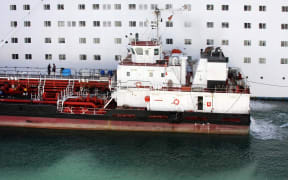The cost of transporting New Zealand's produce to the rest of the world is forecast to increase due to stricter environmental regulations on the shipping industry.

Photo: 123RF
From the beginning of 2020 ships will be required to reduce their sulphur emissions.
ANZ agriculture economist Susan Kilsby said this can be achieved by using cleaner-burning fuel or fitting exhaust devices to capture the sulphur before it is emitted.
The cleaner-burning fuel was considerably more expensive and there might not be sufficient supply of it to meet demand when the new regulations are applied at the beginning of January, Ms Kilsby said.
There was also a risk that the shipping fleet may be reduced while ships are dry docked to have the 'scrubber' devices fitted to their exhaust systems.
"Exactly how this will impact the cost of shipping is yet to be ascertained, but it will have a greater influence on heavy bulk objects like logs than it will on higher-value products such as butter or meat."
At the moment freight costs had been dipping because of slowing global trade but the changes in 2020 were likely to put upwards pressure on prices, Ms Kilsby said.
This impact would be global, but New Zealand was particularly exposed because of the long distance it had to ship goods, she said.
Most product being sent to Asia took three weeks to export, and it took even longer to move goods into Europe.
"It does heighten the need to ship to destinations as close to you as you can and we have been moving a greater portion of our products into the Asian markets and away from the European and US markets over, you know, the last few decades," Ms Kilsby said.



